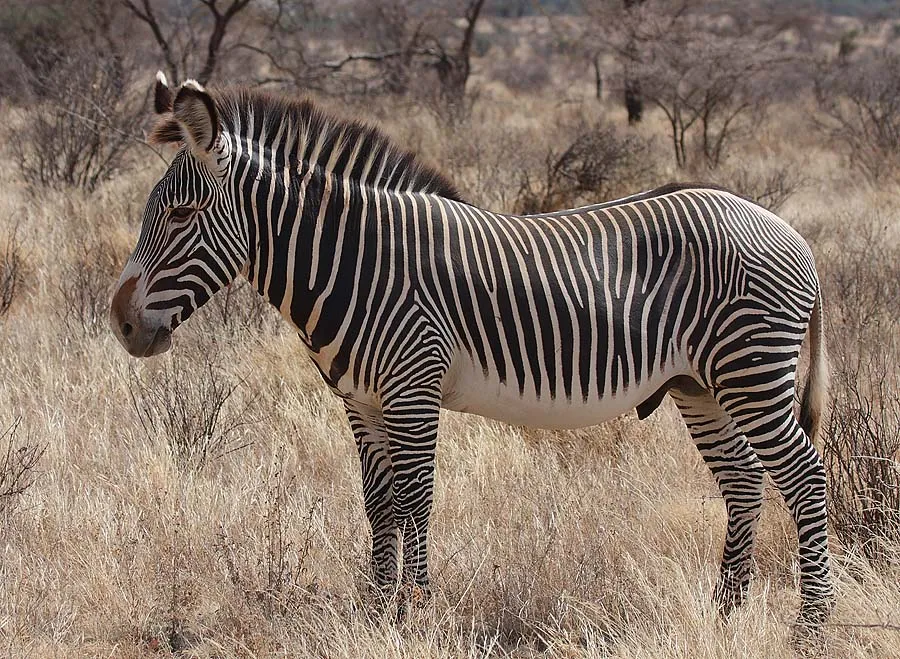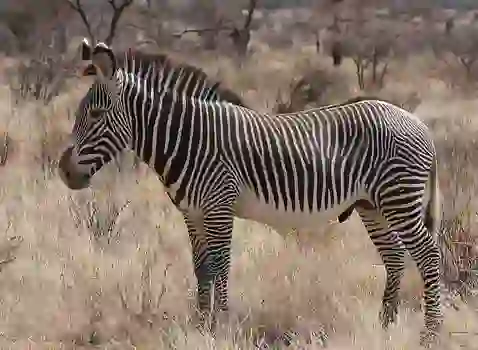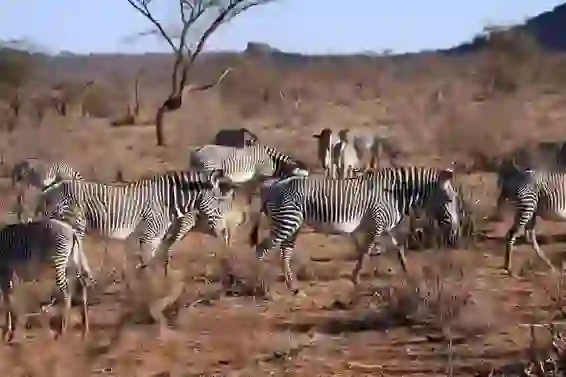
Grévy's Zebra
Grévy's Zebra
Grévy's Zebra
In the arid landscapes of Africa, the Grévy's zebra stands tall. The largest of all zebra species, they possess unique characteristics that set them apart from other zebras. Let's explore the ecology of Grévy's zebra and the challenges they face in their struggle for survival.
Grévy's Zebra Basic Infomation

| Property | Value |
|---|---|
| Scientific Name | Equus grevyi |
| Taxonomic Status | ACCEPTED |
| Rank | SPECIES |
| Kingdom | Animalia |
| Phylum | Chordata |
| Class | Mammalia |
| Order | Perissodactyla |
| Family | Equidae |
| Genus | Equus |
| Conservation Status | Endangered |

Size
Adults can grow up to 4.9 to 5.2 feet (1.5 to 1.6 meters) tall at the shoulder and weigh about 770 to 990 pounds (350 to 450 kilograms). They are the largest living species of zebra.

Lifespan
They can live for about 20 to 25 years in the wild.

Distribution
They are found only in northern Kenya and southern Ethiopia. They prefer arid grasslands and semi-deserts.
Grévy's Zebra Q&A

What kind of zebra is Grévy's zebra?
Grévy's zebra is unique compared to other zebras in several ways.
First, they are the largest zebra species. They also have narrower and more densely packed stripes than other zebras. Their ears are larger and rounder, and their mane is shorter and more erect. These characteristics are believed to be adaptations to their arid environment.

What is the origin of the name 'Grévy's zebra'?
Grévy's zebra was discovered in the 19th century by Jules Grévy, a French explorer.
He received a zebra as a gift from the Emperor of Ethiopia and brought it back to France. This zebra was named 'Grévy's zebra' in his honor.

What do Grévy's zebras eat?
Grévy's zebras are herbivores, primarily grazing on grasses.
They can consume tougher, drier grasses than other zebras, thanks to their digestive system, which is adapted to arid environments. They eat up to 35 pounds (16 kg) of grass a day! They are most active in the mornings and evenings, searching for food. They also need to drink water, and may travel long distances in search of water sources during the dry season.

[Quiz!] Why are Grévy's zebras endangered?
Grévy's zebra is listed as 'Endangered' on the IUCN (International Union for Conservation of Nature) Red List.
Their declining population is primarily attributed to these three factors:
・Habitat loss: Human development is encroaching on their grassland and semi-desert habitats.
・Competition with livestock: They are competing with livestock for food and water.
・Poaching: They are poached for their hides and meat.
Protecting Grévy's zebras requires conserving their habitat, preventing poaching, and mitigating competition with livestock.

[Quiz!] What are the functions of the stripes on a Grévy's zebra?
There are several theories about the function of zebra stripes.
・Camouflage: Zebra stripes may help them blend in with the savanna landscape, making it harder for predators to spot them.
・Thermoregulation: The black and white stripes may help them regulate their body temperature by reflecting and absorbing sunlight.
・Individual identification: Each zebra has a unique stripe pattern, like a human fingerprint, allowing them to recognize each other.
・Insect repellent: Some research suggests that zebra stripes may help repel biting insects.
Stripes are essential for zebra survival!

[Quiz!] What efforts are being made to protect Grévy's zebras?
Various efforts are being undertaken in countries like Kenya and Ethiopia to protect Grévy's zebras. These include establishing national parks and protected areas, strengthening law enforcement against poaching, and engaging in community awareness campaigns.
International conservation organizations are also actively involved in protecting Grévy's zebra. Thanks to these initiatives, the population of Grévy's zebra is slowly increasing. However, they are not out of danger yet. It is crucial for all of us to understand the current situation of Grévy's zebra and contribute to their protection in any way we can.

Would you like to become a part of the 'Animalbook.jp'?
Turn your knowledge into Q&A and share it with the world. ※Publication will be activated after purchase. Let's share information together!
Grévy's Zebra Type of List

Characteristics of Grévy's Zebra
- Largest living zebra species
- Narrow and densely packed stripes
- Large, rounded ears
- Long tail
- Short, erect mane
- Adapted to arid environments
- Live in small herds
- Territorial
- Endangered species
Information
Congratulations! You are the first commenter!

Create Your Favorite List!
Grévy's Zebra
Save the animals you love! Build your own list to quickly revisit your favorites later.

Would you like to leave a comment?
※Please note: This is for the purchase of rights to post comments within the article.
Find Your Favorites!
Our shop offers a unique and attractive selection of goods themed around various animals.
Grévy's Zebra References
Grévy's Zebra Introduction of media used

Rainbirder, CC BY-SA 2.0, via Wikimedia Commons

"Daniel Fafard (Dreamdan)", CC BY-SA 3.0, via Wikimedia Commons

Help Enrich Our Animalbook.jp with Your Media!
We are constantly looking to expand and enrich our Animalbook.jp with amazing photos and videos of animals. If you have any media that you'd like to share, please contribute and help us showcase the beauty and diversity of the animal kingdom. Your submissions will be credited and featured in our encyclopedia, reaching a wide audience of animal lovers.


















